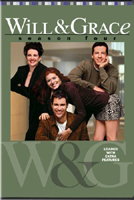 BUY IT AT AMAZON: CLICK HERE!
BUY IT AT AMAZON: CLICK HERE!
STUDIO: Lion’s Gate Home Entertainment
MSRP: $44.98
RATED: TV-14
RUNNING TIME: N/A
SPECIAL FEATURES:
• Blooper reel
• 11 themed featurettes
Situation
comedies are repetitive by nature. Like melodramas, they draw their
entertainment from plot rather than character, and so the characters of a
sitcom begin to feel awfully familiar after only brief exposure to them.
Successful sitcoms are those which keep the plots engaging and fresh, thus
distracting the viewer from the flattened, lifeless characters. This is why I’m
bemused at the success of Will & Grace, which has managed
to spin out seven seasons, with an eighth rapidly approaching, by recycling not
only the characters (which, because of the above reasons, isn’t really a legitimate
basis for complaint) but also the jokes, the gags, and the pratfalls.
And the puns… oh, god, the puns. (At a rate of up to five per show, those of
you with a low pun tolerance might want to move along.)
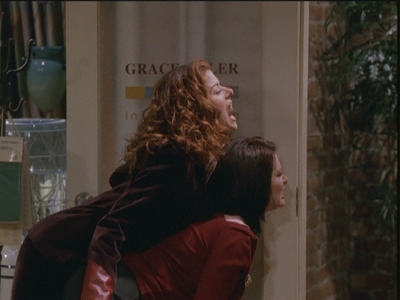
The ice-cream man cometh.
The Show
Each
episode of Will & Grace revolves around the four principal characters.
There’s Grace (Debra Messing), the underdeveloped (physically, emotionally)
woman-child, whose mutant ability is causing or falling prey to simple
misunderstandings, often dealing with sexual relationships. There’s Will (Eric
McCormack), the bland gay man, whose wit is not as quick as that of his friends,
though McCormack is easily the most charismatic and most fun to watch. There’s
Jack (Sean Hayes), the vivacious gay man (read: flaming homo) who hasn’t got a
subtle bone in his body. And there’s Karen (Megan Mullally), the rich broad who
has the power to be drunk, surly, and callous — all at once!
Mathematically,
that gives us about eleven different character combinations between which humor
could develop (unless my math is way off, which is pretty likely seeing as how
I only made it through calculus because my dad was the professor). That’s eleven
different configurations of distinct personalities, which is good, because that
means the writers don’t have to repeat themselves sometimes for five or six
episodes at a stretch. The problem is that there’s no variety in any given
combination. Between Will and Grace (sadly misnamed), the jokes are about
shared history and wordplay; in a scene involving Karen and Grace, every forced
laugh comes from Karen’s selfishness and untarnished opinions; and so on. You
won’t find a shred of variety when the writers are gunning for a chuckle, and
only the barest minimum of changeup during the (thankfully) few dramatic
sequences.
There’s
nothing much to differentiate this season from the ones preceding or succeeding
it. Most of the episodes are one-shots, with a few recurring points of
interest, foremost among them Woody Harrelson as Grace’s boyfriend, Nathan,
during the first quarter of the season. Harrelson does a fine comedic job with
a character who isn’t given nearly as many one-liners as his peers. Unfortunately,
his departure from the show results in the worst of the season’s episodes, the
saccharine "Bed, Bath & Beyond." Why’d you leave, Woody? It’s
those writers who made you do it; they hate
me.
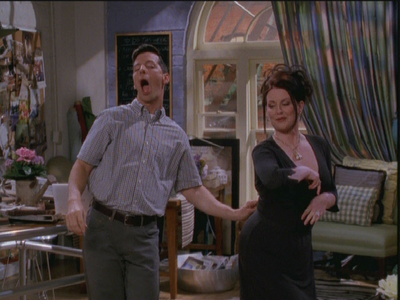
That’s the face of 110V A/C. Robot Karen claims another victim.
Well, the feeling is mutual. My problem is that, despite my low opinion of the
writing on the show, I still find myself chuckling along. I’m highly
susceptible to other people’s laughter. My expression may not be one of mirth,
but I’ll laugh at just about anything that other people laugh at. Laugh tracks,
as a result, whether canned or recorded live, simultaneously engage me and piss
me right the hell off. I did enjoy a few honest laughs over the course of these
four discs, but most of those were caused by guest-stars.
Just as
an experiment, I decided to isolate a bit of the dialogue in textual form, where
it can’t be influenced by a laugh track. This was something of a random sample,
and should be seen as representational of the show as a whole. This is science, folks.
The scene
is in fashionable clothing store Barney’s of
dress a window in a Christmas display, and has enlisted Karen’s help. As Jack
enthuses over all the (unspoken) plans he has for this design, Karen says:
KAREN
You’re a
regular Leonardo!
You know,
even with the extra ell-bees, he’s still my favorite actor.
KAREN
And I
have a feeling this is going to be your Titanic.
JACK
Oh, thank
you.
KAREN
So, how
do I help? what do I do? what do I drink?
Mentally
insert a snippet of laughter in between each line, and that’s how the scene
plays. For anyone not immediately caught up in the plot of an episode, this
incessant, pandering laughter serves to distance the viewer even further from
the humor, though I suspect that the laugh track functions more invisibly, like
continuity cuts, for those viewers involved in the show.
There are
two major categories of humor displayed during this season: the stretching for
a laugh, as above, and the mean-spirited. I was surprised at how callous a show
this turned out to be, since I had always thought that it was given over to
excessive sweetness. Jack and Karen are both characters who are wholly selfish,
and the writers never punish them for their massive hubris. Maybe it’s meant to
be encouraging that strong-willed people can enact their wills no matter the
circumstances.
Sometimes
the low-flying insults are funny, but more often they’re variations on:
"You’re a homosexual." Or, occasionally: "You’re a
heterosexual."
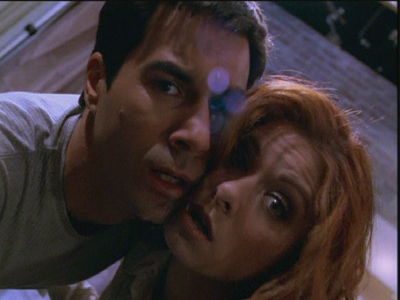
"Why do you hate us, Mr. Reviewer?"
I’m not
in a good position to argue one way or the other about the championing of gay
rights that Will & Grace is widely held to have accomplished, but that
probably won’t stop me from holding unfounded opinions. I don’t see how this
show is supposed to send a positive gay message, whatever that specific
message may be. Will, the more personable gay character, is given a diminished
role in this season in order to make room for Jack, the audience favorite. The
trouble is that Jack is the shallowest of all the characters, the least
interesting, and is given the most predictable gags. He’s a terrible stereotype
of homosexuality, flighty, selfish — all the things that fundamentalists
credit as the root of aberrant gay love.
I don’t
buy the argument that an individual character is meant to represent only a
single person, and therefore stereotypes are allowed, because, hell, you’ve seen stereotypes, right? That
means they exist. No; characters in fiction, television, film have a much
broader existence than do regular humans, and so their stereotypical qualities
are enhanced. Writers have to be especially careful, otherwise they’re setting
up a strawman and not even building an argument around its burning; they’re
just pointing and laughing and expecting us to join along.
I can’t
complain that there’s no character growth; sitcoms are not designed for character
growth. I almost can’t even complain about the repetitive humor, except as it
applies to the sitcom genre as a whole. Alongside its many, less successful
neighbors, then, Will & Grace stands as the epitome of everything that’s
wrong about prime-time scripted comedies. It’s repetitive, it’s aimless, it’s
mean-spirited; but it is funny once
in a while, damn it.
4.5 out of 10
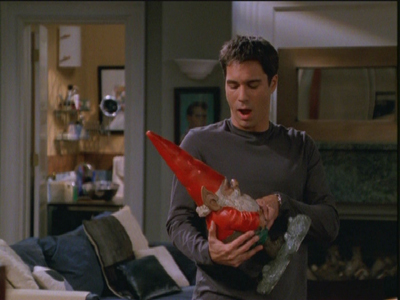
"I’m just going to kiss you. We’ll see what happens after that."
The Look
Fullscreen,
1.33:1 as originally presented. There wasn’t a wealth of quality to begin with,
and the result is fully serviceable but unspectacular. The menus are laid out
imprecisely, making it difficult to navigate past the first four episodes on
any given disc while using a four-arrow remote.
5 out of 10
The Noise
Dolby
2.1. As with the visuals, the audio is unimpressive, but solidly-done. A
bouncy, jazz-inflected piano music that works as theme and for incidental cues.
It’s as immediately identifiable as the Seinfeld slap-bass, but has a
distinct and catchy bit of melody.
The dialogue
is mixed perfectly all the way through. You’ll never miss a single one of Megan
Mullally’s delicate siren songs.
7 out of 10
The Goodies
It’s a
bad sign when "interactive menus" appears on the box to pad out the
features list. The menus are attractive, though, and well-animated.
There’s a
blooper reel which sets up a much better feeling of schadenfreude than the show ever does. I didn’t have a problem
laughing at the misfortune and missteps of actors.
There’s
also a collection of what the marketing department here termed themed
featurettes, which are essentially clip segments compiled from the season. They
have names like "9 to
Physical". The former are all the jokes about work edited together, the
latter all the bits of physical comedy. There are eleven of these featurettes,
and they are pointless unless you’re trying to convince a very dear friend to
watch/not watch the show. (Or if you’re a reviewer trying to find screen
grabs.)
4 out of 10
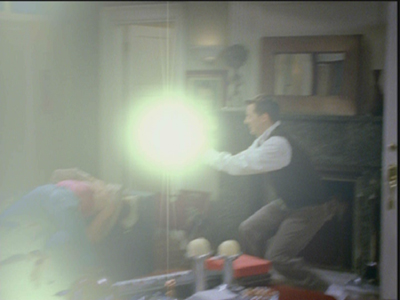
Hadoken?
The Artwork
This
looks as if it were designed by someone on TLC. Teal? Sure, the set looks great
next to my collection of doilies in my elegant (and cheaply made!) crystal DVD
rack, but isolated on a shelf, or a pile of last week’s clothing it just looks
bland.
If you
hold it a few feet away from you and let your eyes gently unfocus, it looks as
though Sean Hayes is gifted with a flat, skirt-clad bottom, but that’s just
Debra Messing with you.
(Guilty
as charged.)
3 out of 10
Overall: 5 out of 10